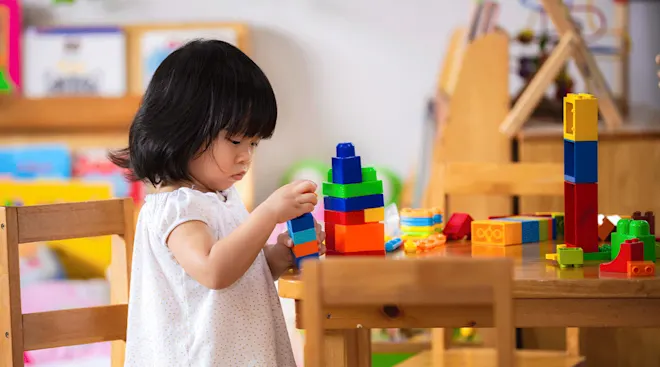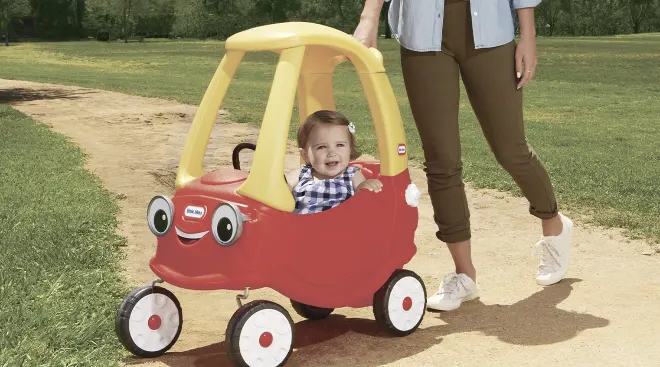Toddler Regression: Why Your Big Kid Is Acting Like a Baby
If there’s one thing to know about being a parent of young kids, it’s that nothing stays consistent for too long. One day you have an independent toddler who has mastered some of the biggest milestones (like potty training), the next they’ve inexplicably reverted back to sucking their thumb and not using their words. This is called toddler regression. The good news: it’s extremely common. The not-so-good news? It’s extremely frustrating.
Toddler regressions typically happen during big life changes; for example, bringing a new baby into the family can cause your toddler to start acting like a baby themselves. Rest assured that this won’t last forever, and eventually your child will pick back up where they left off. In the meantime, here’s everything you need to know about toddler regressions, including what to expect and how to be there for them in this moment of vulnerability.
A toddler regression is when your child starts acting like they don’t know the skills they’ve recently learned (and even mastered) or seems to be going backwards instead of progressing. “This is a temporary phase in which a child displays behaviors characteristic of an earlier developmental stage,” explains Joel “Gator” Warsh, board-certified pediatrician at Integrative Pediatrics and Medicine in Los Angeles, California. “During this period, parents may observe increased clinginess, disruptions in sleep patterns or setbacks in potty training.”
These regressions can feel overwhelming, but they’re short-lived, Gator Warsh promises. It’s also not reflective of your parenting. Suffice it to say that toddler regressions are inevitable. “Regressions are developmentally appropriate, and parents should expect that they’ll happen at some point,” says Tasha M. Brown, PhD, licensed clinical psychologist for children, adolescents and young adults at Thriving Mindful Balanced.
Toddler regressions can occur at different ages, but Warsh notes that they seem to be most common during significant developmental milestones, usually between the ages of 2 and 3. He also says they can last for a few weeks or months, depending on individual circumstances.
There are plenty of reasons a toddler might regress, and many tend to be linked to moments when a child might feel stressed or overwhelmed. “Typically, they occur due to a dramatic change in the child’s lifestyle, routine or setting,” says Brown.
One of the most common reasons for a regression: when a child gains a new sibling. If you have a young toddler, you should expect that they might start forgetting how to use the potty or reaching for pacifiers they’ve long since discarded as a new baby settles in. According to the American Academy of Pediatrics (AAP), this is completely normal and is just your toddler’s way of trying to get your love and attention. To that end, any big change to family dynamics can cause a regression.
Other big events that can lead to a regression include, according to the AAP, moving into a new home, experiencing the death of a family member, a childcare change (like a new babysitter or new school), a parent separation or divorce or even their own major developmental milestone. Toddlers can become so overwhelmed with whatever new situation is happening that they need to take a break from something big they’ve been learning in order to process and adjust. And, in some cases, there’s no real explanation. “There are times when toddler regression occurs and parents are unable to understand why,” Brown says.
During a regression, a toddler will act younger than they are in some way. This can be different for everyone, Brown says, noting that it usually means they seem to lose developmental milestones they recently acquired. Some of the most common regressions include:
- Potty training regression. Toilet training regressions are not uncommon and can take different forms. “It may look like accidents during the day after they’ve already been successful staying dry throughout the day,” Brown says. “It may also look like a child starting to wet the bed again when they’ve successfully stayed dry throughout the night consistently.” They might ask for diapers again or start avoiding the potty completely.
- Sleep routine regressions. Changes in sleep routines as part of a regression are also very common. Brown says this can mean toddlers will skip a nap, go to sleep later, wake up earlier or wake up more often during the night. “Change in sleep can lead to increased irritability, temper tantrums and changes in a child’s mood,” she continues.
- Speech habits. Speech regressions can look like a child who starts saying less words than they usually do—or maybe their speaking isn’t as clear as it once was. According to the American Speech-Language-Hearing Association (ASHA), speech regressions can worry parents because they can be linked to autism, brain injuries or hearing loss. But this isn’t always the case: If your child is experiencing a big change, it could simply be a regression based on stress.
- Pacifier use. When your toddler hasn’t shown interest in their pacifier for weeks or months and suddenly wants it all the time, they might be experiencing a regression.
- Separation anxiety. According to the AAP, separation anxiety typically becomes more intense when toddlers are between 15 and 18 months of age. However, separation anxiety can become an issue when toddlers become more independent and more aware of the separation, or when they’re at preschool age and can understand their anxiety even more. This might mean your toddler is suddenly sobbing whenever you leave them or is having trouble going to school when they used to love it.
Regressions can be really frustrating for caregivers, especially if they’re also going through some sort of big life change. However, it’s important to remember that your child is probably experiencing the regression because they’re going through something big too, and, ultimately, they really just want your love and attention. The good news? You can show them your support and help them get over this hurdle. Below, some tips.
Identify the reason for the regression
Try to figure out what might be causing your child’s regression. “Understanding these triggers enables parents to offer the necessary support and reassurance during such transitions,” says Warsh. Sometimes the reason is obvious, and sometimes it’s not. But once you know what could be causing the regression, you can come up with a better plan to help your toddler adjust and feel more comfortable.
Stay calm and patient
“Parents should create a calm and supportive environment by providing extra comfort and attention,” Warsh advises. There’s no reason to get annoyed with them, and punishments aren’t going to help them feel supported or comfortable. Instead, try to remind yourself that this is temporary and just offer plenty of love.
Continue to maintain daily routines
Maintaining a consistent routine is essential. “Routines are extremely important for toddlers,” Brown says. “They’ll help children feel safe and help them get back on track sooner than later.”
Use positive reinforcement
Focus on what your toddler is doing right to build up their confidence. “Praise the behaviors you would like to see,” Brown says. “Think about the behavior that you’re seeing a regression in, and praise your child when you see they’re hitting a target behavior. For example, if you see a regression in toilet training, praise your child when they attempt to use the bathroom or engage in toileting appropriately.”
Take a break
With some toddler regressions, it might be better to step back and take a break from whatever you’ve been trying to teach them. Taking a beat can help ensure your kiddo is really ready for this change.
Slowly reintroduce skills
Be prepared to help your child re-learn things they’ve already learned. They might wake up one day and just pick up where they left off, but they might not. Warsh recommends reintroducing skills gradually and encouraging independence. Be patient and don’t push them into something, as that can lead to them pushing back. At the same time, don’t make it easy for them to go completely backwards.
While regressions are normal, they can occasionally be cause for concern. “Sometimes, regressions can be a sign of something more serious, and then a bigger intervention is needed,” Brown says. “We know that early intervention is key, so speaking to a pediatrician can be very important.”
Regressions should last only a few weeks and usually self-correct, but Brown recommends that caregivers provide specific timelines to their child’s provider, if needed. Gator Warsh says to contact a pediatrician if the regression continues over a long period of time or “is accompanied by other worrisome symptoms, like loss of acquired skills or significant behavioral changes that cause distress to the child.”
Since the ASHA notes that speech regressions can be linked to things like autism and hearing loss, you may want to reach out to your pediatrician if your toddler is experiencing this type of regression, especially if it seems to come on out of nowhere.
It can be upsetting to watch your child revert back to old behaviors or forget things you so carefully helped teach them. But, remember: toddler regressions are normal, developmentally appropriate and temporary. Your child will eventually get through whatever they’re dealing with and regain important skills back. In the meantime, being supportive, calm and patient can help speed things up.
Plus, more from The Bump:
Tasha M. Brown, PhD, is a licensed clinical psychologist for children, adolescents and young adults at Thriving Mindful Balanced in New York. Brown completed her doctor of philosophy in clinical psychology in 2016 from DePaul University, and went on to complete her predoctoral internship and postdoctoral fellowship at the University of Miami, Miller School of Medicine.
Joel “Gator” Warsh, is a board-certified pediatrician at Integrative Pediatrics and Medicine in Los Angeles, California. He earned his medical degree from Thomas Jefferson Medical College in Philadelphia.
American Academy of Pediatrics (AAP), Preparing Your Family for a New Baby, April 2019
American Speech-Language-Hearing Association (ASHA), Tracing the Roots of Speech-Language Regression in Toddlers, January 2024
American Academy of Pediatrics (AAP), How to Ease Your Child’s Separation Anxiety, July 2021
Learn how we ensure the accuracy of our content through our editorial and medical review process.
Navigate forward to interact with the calendar and select a date. Press the question mark key to get the keyboard shortcuts for changing dates.




















































